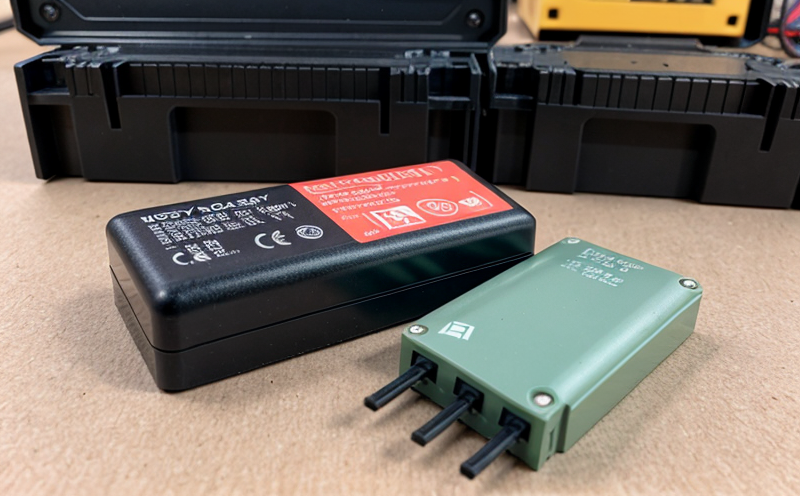DIN EN 62660-3 Performance Testing of Lithium-Ion Battery Modules
The standard DIN EN 62660-3 provides a comprehensive framework for the performance testing of lithium-ion battery modules. This standard ensures that battery systems meet stringent safety, reliability, and durability requirements set by international regulatory bodies. Compliance with this standard is critical for manufacturers aiming to meet global market demands, particularly in sectors like automotive, renewable energy storage, and consumer electronics.
The testing protocol outlined in DIN EN 62660-3 covers a wide range of parameters that are essential for evaluating the performance of lithium-ion battery modules. These include:
- Electrochemical performance
- Cycling stability
- Thermal performance
- Safety margins under various environmental conditions
- Energy content and power density
- Pulse charge capability
- Battery management system (BMS) functionality
The testing process involves rigorous procedures that simulate real-world operating conditions to ensure the reliability of lithium-ion battery modules. The standard emphasizes the importance of accurate specimen preparation, precise measurement techniques, and thorough data analysis to provide reliable test results.
Compliance with DIN EN 62660-3 is particularly important for manufacturers in the automotive industry, where safety regulations are stringent. It also ensures that renewable energy storage systems meet environmental standards by guaranteeing consistent performance under varying temperature and load conditions. Additionally, this standard supports the development of next-generation battery technologies by providing a benchmark against which new designs can be evaluated.
Our laboratory adheres strictly to DIN EN 62660-3 when conducting testing for lithium-ion battery modules. We employ state-of-the-art equipment and experienced personnel to ensure that all tests are conducted with precision and accuracy. Our commitment to quality ensures that you receive reliable, reproducible test results that meet international standards.
Why It Matters
Compliance with DIN EN 62660-3 is crucial for several reasons:
- Safety Compliance: Ensures adherence to stringent safety regulations, reducing the risk of accidents and recalls.
- Market Access: Helps manufacturers enter new markets by meeting regional standards.
- Quality Assurance: Provides a benchmark for evaluating the performance of lithium-ion battery modules.
- Regulatory Compliance: Ensures that products meet government and industry regulations.
- R&D Support: Facilitates innovation by providing data for improving product design.
The importance of this standard cannot be overstated, as it directly impacts the safety, reliability, and performance of lithium-ion battery modules. By ensuring compliance with DIN EN 62660-3, manufacturers can gain a competitive edge in the global market and ensure consumer trust in their products.
Benefits
The benefits of adhering to DIN EN 62660-3 are numerous:
- Enhanced Safety: Reduces the risk of accidents by ensuring that battery modules meet stringent safety requirements.
- Better Quality Assurance: Provides a clear framework for evaluating and improving product performance.
- Increased Market Access: Ensures compliance with international standards, facilitating market entry in countries with strict regulations.
- Improved Consumer Trust: Builds confidence among consumers by demonstrating adherence to rigorous testing protocols.
- Competitive Advantage: Offers a competitive edge by ensuring that products meet the highest safety and performance standards.
- Faster Product Development: Provides data for optimizing product design and improving efficiency in R&D processes.
By adhering to DIN EN 62660-3, manufacturers can ensure that their lithium-ion battery modules meet the highest safety and performance standards, thereby gaining a competitive advantage in the global market.
Eurolab Advantages
At Eurolab, we offer unparalleled advantages when it comes to DIN EN 62660-3 performance testing of lithium-ion battery modules:
- Expertise and Experience: Our team comprises highly skilled professionals with extensive experience in conducting compliance tests.
- State-of-the-Art Equipment: We utilize the latest equipment to ensure precise and accurate test results.
- Precision and Accuracy: Our commitment to quality ensures that all tests are conducted with precision, delivering reliable data.
- Comprehensive Testing Capabilities: We provide a full range of testing services, covering all aspects of DIN EN 62660-3 compliance.
- Fast Turnaround Times: Our efficient processes allow us to deliver test results quickly, enabling faster product development and market entry.
- Compliance Verification: We ensure that your products meet all relevant international standards, providing peace of mind for manufacturers.
With Eurolab, you can be confident that your lithium-ion battery modules are being tested to the highest standards, ensuring compliance with DIN EN 62660-3 and other relevant regulations.





